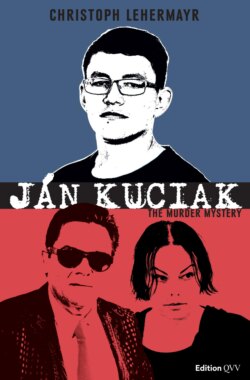Читать книгу Ján Kuciak - Christoph Lehermayr - Страница 10
На сайте Литреса книга снята с продажи.
A contract killer confesses
ОглавлениеAlmost two years later, police officers from a special unit wearing balaclavas and with machine guns at the ready present a man in handcuffs. He’s wearing grey-spotted camouflage pants and a black sweater and has a stubbled shaven head. His face is devoid of expression. When he speaks it sounds mechanical, clipped, the sentences short and terse like they were being spat out, without a trace of emotion, as if what’s being said has nothing to do with him. It’s Miroslav Marček, the killer. He’s confessing. As he describes his crime, the spectators in the court gasp: “When I arrived at the house, the gate in the fence was open. But there were no lights on in the house and the door was locked. I hid in the garden shed in the yard. It took quite a long time. Then Mr. Kuciak and Miss Kušnírová arrived back together. I waited a while longer for a good opportunity to arise. The chance came when I saw Miss Kušnírová go to the toilet. I went to the door and knocked. When Mr. Kuciak opened the door I shot him in the chest. He fell and held on to the door with one hand. Then unfortunately she suddenly came. She ran into the kitchen and I ran after her. There I shot her in the head. I saw that she was dead immediately. As I was going out, I shot a second time at Ján Kuciak, who was lying on the stairs. I closed the door of the house behind me and the garden gate as well. Then I called Mr. Szabó and let it ring once. That was our agreed sign. He picked me up at the football field. I got in the car and we drove off. Later on we threw the weapon and the leftover ammunition into the Váh River.”
The alleged assassin Miroslav Marček in court
Photo: Tomáš Benedikovič
Miroslav Marček was to receive a fee of €20,000 for the murder – in €500 notes, packed in paper serviettes. His partner and cousin Tomáš Szabó received the same amount. Neither of them knew Ján Kuciak personally, nor did they know who ordered his death. All they’d been told was that he worked as a journalist. “He must have written about something he shouldn’t have written about,” said Marček in court, “but after the crime there was no point in trying to find out about what or who.”
